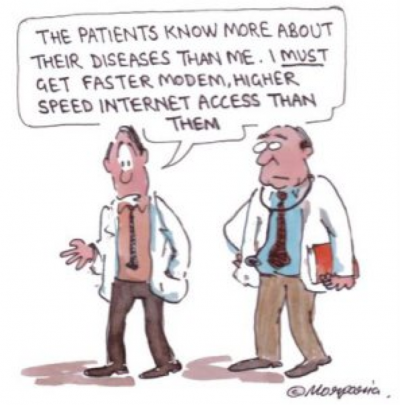Real Immersion into the World of the Patient
Patients are being “empowered” and are playing a more active role in defining treatment goals and treatment decisions. Pharma companies need to understand the changing environment and their patients’ mindsets and experiences in order to support them and promote the benefits of their products.

“The trouble with market research is that people don’t think how they feel, they don’t say what they think and they don’t do what they say". David Ogilvy.
According to Michele Derai, CEO Aptel Research, speaking to eyeforpharma ahead of his presentation at the eyeforpharma Patient Summit, the epicenter of the health care system is expanding from the doctor’s office to the patients' homes: “This is especially true for chronic diseases where patients’ adherence to treatments as well as their ability to modify their behavior is paramount to improving health outcomes. Patients have increased influence and power over healthcare decisions, including prescribing choices. Given this shift in power, it is critical for healthcare organizations to better understand the patient experience and decision drivers on both rational but also emotional levels. In this 'noisy' environment, healthcare companies need to communicate clearly the benefit of their products and services and favor individual preferences rather than a one-size-fits-all offering. But in order to do that, they need an holistic overview of the patient journey and to integrate not only patients but also their healthcare providers. This approach will help companies better define who to reach, how and with which tools in order to better support patients’ experiences”.
Methodologies
To capture customers’ experiences and mindsets, various methodologies can be used such as qualitative interviews that incorporate projective and ethnographic techniques, observational research, social media or a mix of qualitative/quantitative and social media.
Marketers and market researchers must keep up with this trend and make sure they are able to help their stakeholders answer the following key questions on the local as well as global country levels:
- How do we understand patient experiences and journeys?
- How do we understand the drivers and barriers to patient attitudes and behaviors?
- How do we communicate clearly product benefits to patients?
- How do we impact the patient-physician dialogue?
- Which tools or services to develop to better support patient experiences?
Pinpointing when patients are actively engaged
Identifying key stages in the patient journey is vital to understanding the patient’s concerns and needs, the various influencers in their journey (e.g., physicians, family, friends, social media) and their openness to receiving information on their disease and treatment.
However, once they get through their first round of treatment (chemotherapy or targeted therapy), they tend to begin seeking out information about their disease and available treatments, becoming much more actively engaged with treatment decisions".
“Over the past year, we have conducted multiple patient-focused research studies in oncology with patients, caregivers, oncology nurses and oncologists/haematologists.
While there are differences based on specific cancer-type, patients tend to have a similar experience: at the time of diagnosis, they are in shock and/or in denial. They need to process their diagnosis and fears and are not able to engage with new information or treatment decisions. Therefore, they tend to rely heavily on their hematologist/oncologist to recommend treatment, and look to the physician as an expert. However, once they get through their first round of treatment (chemotherapy or targeted therapy), they tend to begin seeking out information about their disease and available treatments, becoming much more actively engaged with treatment decisions. At this point in their journey, many usually want to create more of a partnership with their physicians. Many also turn to the internet to meet other people with the same diagnosis to share experiences and to find support. This insight is invaluable in identifying when they are actively engaged in their treatment and are open to receiving information”, asserts Derai.
Capturing Patient Insights: Overcoming 5 Challenges
Here are 5 common challenges that surface when capturing patient insights and how to overcome them:
- Recruitment of appropriate patients may be challenging and is crucial for the research. It requires structured and well thought out screening questions.
- Based on the prevalence of the disease or condition, it may be difficult to find a sufficient number of appropriate patients for the research. Caregivers or nurses can be used as surrogate for patients.
- Reaching patients for rare diseases for face-to-face interviews in central locations is challenging; webex with video interviews may offer a solution to reach these types of patients.
- Capturing patients’ feelings/emotions can prove challenging and may require projective techniques; here, an experienced moderator can help patients feel suitably comfortable and in a safe environment to share their emotional journey.
- Methodologies need to adapt to patients’ characteristics. For example, for research which requires showing information to respondents, face-to-face interviews are more appropriate than phone with webex link for older patients since they are usually less internet savvy; for patients with cognitive issues, more time needs to be allocated for the interview to give them time to process the information.
Genuine patient centricity means understanding the patient’s experience of his or her condition, what they value and need and what is most likely to result in a positive healthcare outcome. Investment in understanding patients’ preferences, desires and cultural attitudes will facilitate the design of tailored products, services and education strategies that will genuinely differentiate the patient-centric from the rest.
Michele Derai, CEO, Aptel Research will be speaking at the Patients Summit in London 17-18th June 2014. For more information on her presentation, click here.
